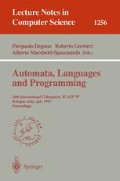Abstract
We present a general semantic universe of call-by-value computation based on elements of game semantics, and validate its appropriateness as a semantic universe by the full abstraction result for call-by-value PCF, a generic typed programming language with call-by-value evaluation. The key idea is to consider the distinction between call-by-name and call-by-value as that of the structure of information flow, which determines the basic form of games. In this way call-by-name computation and call-by-value computation arise as two independent instances of sequential functional computation with distinct algebraic structures. We elucidate the type structures of the universe following the standard categorical framework developed in the context of domain theory. Mutual relationship between the presented category of games and the corresponding call-by-name universe is also clarified.
Supported in part by EPSRC Fellowships and JSPS Research Fellowships.
Preview
Unable to display preview. Download preview PDF.
References
Abelson, H., Sussman, G.J., Structure and Interpretation of Computer Program, MIT Press, 1985.
Abramsky, S. and Jagadeesan, R., Games and Full Completeness for Multiplicative Linear Logic, Journal of Symbolic Logic, 59(2), pp. 543–574, 1994.
Abramsky, S., Jagadeesan, R. and Malacaria, P., Full Abstraction for PCF, 1994. To appear.
Abramsky, S. and McCusker, G., Linearity, Sharing and State: a fully abstract game semantics for Idealized Algol with active expressions, ENTCS, Vol.3, North Holland, 1996.
Abramsky, S. and McCusker, G., Call-by-value games, a typescript, 12p, Apr. 1997.
Berry, G. and Curien, P. L., Sequential algorithms on concrete data structures. TCS Vol.20, pp.265–321, North-Holland, 1982.
Blass, A., A game semantics for linear logic, Annuals of Pure and Applied Logic, 56:183–220, 1992.
Curien, P. L., Sequentiality and full abstraction. In Proc. of Application of Categories in Computer Science, LNM 177, pp.86–94, Cambridge Press, 1995.
Danos, V. and Regnier, L., Games and abstract machines. LICS'96, IEEE, 1994.
Felshcer, W., Dialogue games as a foundation for intuitionistic logic, Handbook of Philosophical logic, Vol.3, pp.341–372, D. Reidel Publishing Company, 1986.
Fiore, M., Axiomatic Domain Theory in Category of Partial Maps, PhD thesis. ECS-LFCS-94-307, Univ. of Edinburgh, 1994.
Fiore, M. and Plotkin, G., An Axiomatisation of Computationally Adequate Domain Theoretic Models of FPC. LICS'94, pp.92–102, IEEE, 1994.
Freyd, P., Algebraically Complete Categories, In Proc. of Como. Category Theory Conference, LNM 1488, pp.95–104, Springer Verlag, 1991.
Girard, J.-Y., Linear Logic, TCS, Vol.50, pp.1–102, North-Holland, 1987.
Gunter, C., Semantics of Programming Languages: Structures and Techniques, MIT Press, 1992.
Harmer. R., Malacaria, P., Linear foundations of game semantics, a typescript, Sep. 1996.
Honda. K., Yoshida. N., Name-Passing Games: a functional universe, a typescript. 35p, Nov. 1996.
Honda, K. and Yoshida, N., Game-theoretic Analysis of Call-by-value Computation (full version of this paper), ftp-able at ftp.dcs.ed.ac.uk/export/kohei/cbvfull.ps.gz, Feb, 1997.
Hyland, M. and Ong, L., On Full Abstraction for PCF: I, II and III, 130 pages, ftp-able at theory.doc.ic.ac.uk/papers/Ong, 1994.
Hyland. M. and Ong, L., Pi-calculus, dialogue games and PCF, FPCA'93, ACM. 1995.
Laird, J., Full abstraction for functional languages with control, LICS'97, IEEE, 1997.
Kahn, G. and Plotkin, D., Domaines Concrets. INRIA Report 336, 1978.
Longo, G. and Moggi, E., Cartesian closed categories of enumarations for effective type-structures, LNCS 173, Springer-Varlag, 1984.
McCusker, G., Games and Full Abstraction for FPC. LICS'96, IEEE, 1996.
Milner, R., Fully abstract models of typed lambda calculi. TCS, Vol.4, 1–22, North-Holland, 1977.
Milner, R., A Calculus of Communicating Systems, LNCS 76, Springer-Verlag, 1980.
Milner, R., Functions as Processes. MSCS, 2(2), pp. 119–146, 1992.
Milner, R., Sorts and Types of π-Calculus, a manuscript, 43pp, 1990.
Milner, R., Polyadic π-Calculus: a tutorial. Proceedings of the International Summer School on Logic Algebra of Specification, Marktoberdorf, 1992.
Milner, R., Tofte, M. and Harper, R., The Definition of Standard ML, MIT Press, 1990.
Moggi, E., Partial morphisms in categories of effective objects, Info.&Comp., 76:250–277, 1988.
Moggi, E., Notions of Computations and Monads. Info.&Comp., 93(1):55–92, 1991.
Nickau. M., Hereditarily Sequential Functionals, LNCS 813, pp.253–264, Springer-Verlag, 1994.
Ong, L., Correspondence between Operational Semantics and Denotational Semantics, Handbook of Logic in Computer Science, Vol.4, pp.269–356, Oxford University Press, 1995.
Plotkin, G., LCF considered as a programming language, TCS, 5:223–255, North-Holland, 1975.
Plotkin, G., Lecture on Predomains and Partial Functions, Notes for a course given at the Center for the Study of Language and Information, Stanford, 1985.
Power, J., Robinson, E., Premonoidal Categories and Notions of Computation, To appear in MSCS.
Riecke, J., and Sandholm,A. Relational Account of Call-by-value Sequentiality, LICS'97, 1997.
Robinson, E. and Rosolini, P., Categories of Partial Maps, Info.&Comp., 79:95–130, 1988.
Sieber, K., Relating Full Abstraction Results for Different Programming Languages, FST/TCS'10, pp. 373–387, LNCS 472, Springer-Verlag, 1990.
Winskel, G., Synchronization Trees, TCS, Vol.34, pp. 33–82, North-Holland, 1985.
Winskel, G., The Formal Semantics of Programming Languages, MIT Press, 1993.
Author information
Authors and Affiliations
Editor information
Rights and permissions
Copyright information
© 1997 Springer-Verlag Berlin Heidelberg
About this paper
Cite this paper
Honda, K., Yoshida, N. (1997). Game theoretic analysis of call-by-value computation. In: Degano, P., Gorrieri, R., Marchetti-Spaccamela, A. (eds) Automata, Languages and Programming. ICALP 1997. Lecture Notes in Computer Science, vol 1256. Springer, Berlin, Heidelberg. https://doi.org/10.1007/3-540-63165-8_180
Download citation
DOI: https://doi.org/10.1007/3-540-63165-8_180
Published:
Publisher Name: Springer, Berlin, Heidelberg
Print ISBN: 978-3-540-63165-1
Online ISBN: 978-3-540-69194-5
eBook Packages: Springer Book Archive

